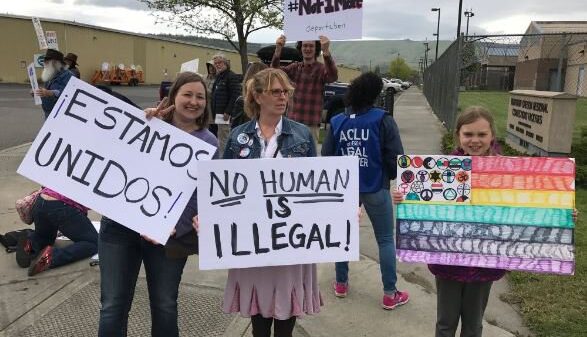Cristina Alonso, a 22-year-old college student from Spain, planned to visit Oregon for six weeks this summer. Instead, border agents sent her to NORCOR jail in the The Dalles for two nights. Her friend, university librarian Laurie Bridges, shares the shocking story.
On Wednesday, July 5, I arrived at the airport in Portland to pick up a family friend, 22-year-old Cristina Alonso. Cristina had purchased a roundtrip ticket, from Madrid to Portland and would be staying with my family in Corvallis for exactly six weeks.
A mutual friend in Spain had connected us six months prior. Cristina was interested in coming to the U.S. to have a “cultural experience,” as she put it. We have hosted other students in the past and we thought it would be a great experience for all of us, so we came up with a plan for her to visit us for the summer. Cristina wanted to work on her English, and my son needed help with his Spanish, so we offered to give her $100 per week to help make the trip work on her budget. We also made plans to go on trips to Bend and Seattle so she could see a little more of the country.
Although she was excited, she was also very nervous about visiting the United States. It was her first time traveling outside of the European Union and the news about President Trump had raised concerns about traveling here. To help ease her fears, I wrote up a short letter that I scanned and emailed to her, though I never imagined she would have any trouble. The letter stated simply that Cristina would be visiting us in Corvallis for six weeks, she was a friend of the family, she would help my son with his Spanish and we would help her with her English, and we would go on trips to Bend, Oregon and Seattle, so that she could see more of the country. I also included my phone number in the letter.
While I waited for Cristina at the airport, she messaged me to say she had landed and she also sent a photo of the long line at Customs. An hour and a half later, I got a call from a man who said he was a border agent. He told me that he was with Cristina and that she had the wrong visa. He told me that he understood she was visiting us, mostly to help my son with his Spanish, but the $100 per week allowance we had planned on giving her meant she should have a different visa. He told me he would see what he could do and that he would call me back. The phone call lasted no more than two minutes. He never called back and Cristina stopped answering messages.
In a panic, I called the number back several times, but there was no answer and a message said the mailbox was full. I frantically messaged back and forth with her parents and my friend to help translate. Disturbingly, we could see that someone was opening and viewing the messages we sent to Cristina, but there was no response.
I called the main airport information line, asking where Cristina might be, and they said that Customs doesn’t share information with them. I found online that the Customs office was one mile away. I got in my car and drove over there, but it was closed for the night.
I desperately called many phone numbers and sent various messages, including to the ACLU and the Spanish consulate in San Francisco. But it was late and everything was closed. At about midnight, I didn’t know what else to do, so I went to a hotel near the airport to wait until the Customs office opened in the morning.
I had a restless night wondering what could have happened to my friend. First thing in the morning, I started back up with phone calls. Someone finally answered the number that the border agent had called me from. I told him my story, and asked where Cristina was.
“I have no idea,” he quipped.
“How can I find out where she is?”
The agent told me I needed to talk to administration, but they weren’t in yet. I decided to drive back to the customs office, to try to speak with someone in person. I arrived just as they opened.
Someone there finally told me that Cristina had been denied entry into the country, and had been taken to a “holding facility” to await a return flight the next day in the evening. They wouldn’t tell me where the facility was, but they told me that Cristina had access to a phone and could call if she wanted to.
After more calls and more dead ends, I dejectedly returned to my home in Corvallis. From there, I started reaching out to more people, including someone who said I should call the ACLU of Oregon immigration hotline. Minutes after I called, I received a reply telling me that Cristina was being held in jail at the Northern Oregon Regional Correction Facility (NORCOR) in The Dalles. I couldn’t believe that the “holding facility” was actually a jail. It was worse than I imagined.
I called the jail immediately. They asked if I was a lawyer and I said I was a friend and the only person Cristina knew in the United States.
“We don’t just let friends call up prisoners!”
The jail staffer told me that I’d need to create an online account in order to send a message to Cristina. I got an account, deposited money and sent a message saying, “I finally found you!” It had been approximately 20 hours since her parents or I had been in contact with Cristina.
In all, Cristina was held for 38 hours with the jail population, though she had committed no crime. She was treated poorly, and denied medical treatment when she requested it. She had no money in her jail phone account and no access to her belongings, so could not call out to family members. Once I found out about the phone account, it took $130 to send messages and make phone calls over the next 24 hours.
Cristina was taken from NORCOR back to Portland International Airport the next day where she was able to board a plane and exit the nightmare that the United States had been for her.
Even if she had the wrong visa, was sending a 22-year-old college student to jail the only option? They could have released her to me for two days, to be returned to the airport for her return flight. They could have explained the situation to me or her family. They could have provided her with one free phone call. But they did not. If I had not gotten ahold of the ACLU of Oregon, who finally told me where Cristina was being held, nobody would have heard from her for at least 48 hours.
I would have never believed that this could happen in the United States, let alone in Oregon. But I have learned that ICE operates in isolation and ignores the human rights that I have come to expect as an American. I encourage every Oregonian to protest the expansion of the ICE detentions at NORCOR in The Dalles. I also tell everyone to avoid entering on international flights through Portland International airport, even though it is supposed to be our gateway to the world.
Correction, 10/18/2017: Cristina Alonso was detained for 48 hours, 38 of which were at NORCOR jail in The Dalles.


